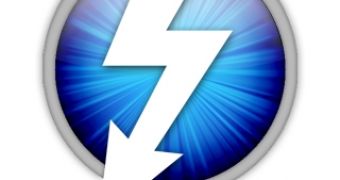When it is not arguing that its ‘App Store’ dubbing is not generic, Apple is filing ever newer Thunderbolt trademarks with the United States Patent and Trademark Office, and the latest one emerged this weekend, with a filing date of May 6. For those who are tracking Apple in the news, the filing date might seem strange for a trademark that's supposedly Intel's.
Thunderbolt is the marketing name for Intel’s Light Peak technology - an interface for connecting peripheral devices to a computer via an expansion bus. It was commercially introduced with Apple's early-2011 MacBook Pro line.
Last week, we reported that Apple was not, in fact, the owner of the Thunderbolt trademark, as Intel’s communications manager said the Mac maker had simply helped with the initial filings.
There had been a lot of debate as to which of the two technology mammoths it owned the name.
“As part of our collaboration with Apple, they did some of the initial trademark filings,” Dave Salvator told Bright Side of News.
“Intel has full rights to the Thunderbolt trademark now and into the future. The Thunderbolt name will be used going forward on all platforms, irrespective of operating system,” Intel’s communications man said.
As readers will agree, May 6th, 2011 seems far off from the initial filings date.
Surely, this is reason enough for trouble between the two companies whose relationship has been extremely tight (not to mention fruitful) over the past five years.
So who’s right and who’s wrong?
Well, the source originally reporting on Apple’s ‘initial’ trademark filings, Patently Apple, has a wild theory about Apple’s lawyers simply forgetting to file the documents with USPTO in good time, also being unaware of the so-called transferring of this trademark.
A strong indication that Apple plans to hold on to Thunderbolt also comes from the company’s website, where the Thunderbolt web page refuses to acknowledge Intel's trademark at the bottom of their page which, according to the invention-centric site, “is common courtesy and professional practice.”
Granted, it's not farfetched, but it's certainly not far from farfetched either. Of course, there are other possibilities as well, like:
a) Intel’s communications manager had bad ‘intel’; b) Salvator was mis-quoted; c) Intel is lying as the chip maker and Apple are quietly throwing fists behind closed doors until they agree who should own the trademark; d) Apple is still helping with the filings and will transfer the trademark over to Intel when the time is right.
One thing is for sure, though. At least one more statement - either from Apple or Intel - will be necessary to clear this whole mess up.
That, and a widely publicized lawsuit.

 14 DAY TRIAL //
14 DAY TRIAL //